26 Jun 2014 | Azerbaijan, Azerbaijan News, News
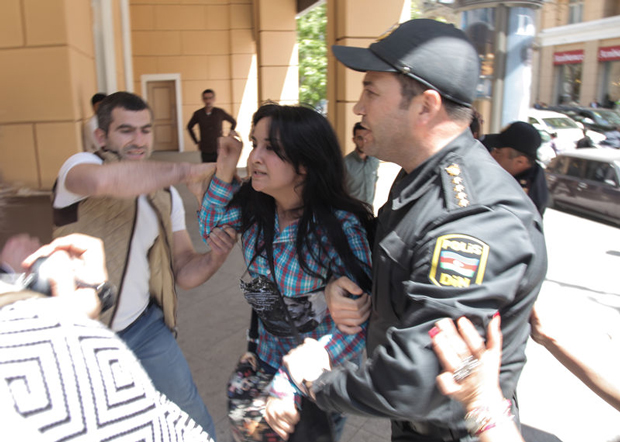
The Baku Court of Grave Crimes announced the verdict for the NIDA movement activists in May 2014. The human rights defenders Rashadat Akhundov, Zaur Gurbanly and Ilkin Rustamzadeh to 8 years’ imprisonment, Rashad Hasanov and Mamed Azizov – to 7.5 years. Protesters were detained and victimised by police. (Photo: Aziz Karimov / Demotix)
In a bleakly comic turn at the beginning of Ilham Aliyev’s address to the Parliamentary Assembly of the Council of Europe this week, Assembly president Anne Brasseur asked press photographers to leave the chamber and reminded those present that they were not permitted to vocalise their approval or disapproval during the Azerbaijani dictator’s stand. It appeared that Brasseur hadn’t quite meant what she said, as in the end photographers at the front of the room were merely required to move their tripods to ensure everyone in the room could see Aliyev as he spoke.
Aliyev’s speech was given to mark the Azerbaijan’s taking up of the chair of the Council of Europe’s Committee of Ministers last month. And what a speech it was!
The man who promises to “turn initiatives into reality” (still no idea) told of Azerbaijan’s enormous progress in all fields, not just oil fields. He spoke of the country’s “very positive atmosphere” and listed the country’s great freedoms: freedom of political activity, freedom of expression, freedom of media… Azerbaijan was proud of these freedoms, he said. Azerbaijan knew that an uncensored internet and independent newspapers were important for democracy.
It was a lovely speech, and also one that contained barely a word of truth beyond the conjunctions. Aliyev may as well have praised the nation’s Quidditch team for defeating Ravenclaw on penalties at the World Cup. He could have told us about his new motorcar, and his adventures with Ratty, Mole and Badger, and been more believable.
Watching Aliyev, the only time one got the sense he even believed what he was saying himself was when discussing the disputed territory of Nagorno-Karabakh, and even then he was only drily insisting that the regions “geographical toponyms” (place names?) were Azeri in origin: All Your Geographical Toponyms Are Belong To Us, so to speak.
The truth about Azerbaijan is quite different from the picture painted by its president this week. As Human Rights Watch pointed out ahead of the Council of Europe speech, “In the past two years, Azerbaijani authorities have brought or threatened unfounded criminal charges against at least 40 political activists, journalists, bloggers, and human rights defenders, most of whom are behind bars.” Search for Azerbaijan stories on Index, and you will find more details of those arrests and abuses.
And this isn’t exactly obscure knowledge. People know three things about Azerbaijan: it has a lot of gas and oil; it takes Eurovision very seriously; and it has a poor human rights record. After his speech, Aliyev was confronted by Michael McNamara of the CoE socialist group, who quoted Amnesty’s statistic that there are currently 19 political prisoners in Azerbaijan. Not so, said Aliyev. There are no political prisoners in Azerbaijan. The people who came up with these statistics were lying. There was a programme of “deliberate provocation” against Azerbaijan — though it was unspecified who was leading this programme.
Aliyev swore that this plot to undermine Azerbaijan would fail.
The Azerbaijani president is not alone in his capability for bare-faced falsehood. It’s a specific strain of Soviet and post-Soviet behaviour, learned from the Communist Party and the KGB. If the leader says something, it is true, no matter what the evidence to the contrary. There are no political prisoners in Azerbaijan, says Aliyev, and we encourage a free media because it is important to our democracy; Ukraine has been taken over by fascists, says Vladimir Putin, and Russia has no choice but to fight them. There is no point in putting on a play about depression in Belarus, an Alexander Lukashenko apparatchik tells the Belarus Free Theatre, because there is no such thing as depression in Belarus.
“So what?” you may say. “Politicians and institutions lie.” And you’d be right. But this is a form of lying that goes far beyond “I was perfectly within my rights to claim those expenses”/”I did not have sex with that woman”. Political lies in functioning democracies tend to have to do with cover ups of personal or institutional failings. In an authoritarian society, with power utterly concentrated to the leader and his cadre, there is no such thing as an isolated failure. As a result, every aspect of life must be spun. All triumphs belong to the leader, all criticisms are propaganda, all failures sabotage. When there is no balance of power, is there really an objective truth? When, for example, the dictator Lukashenko told a journalist that journalist Irina Khalip, under house arrest, could leave Belarus any time she wanted, was that actually true? Was it true the moment he said it? Did it become true after he said it? And did it remain true?
This state of things raises a question for those of us seeking to better the lot of people living under regimes such as Belarus and Azerbaijan: can we pounce on the moments when autocrats declare as fact something we know to be untrue, cling on until they actually make it true? Or does this merely confirm the idea that truth is whatever their whim makes it?
This article was posted on June 26, 2014 at indexoncensorship.org
24 Jun 2014 | Egypt, Middle East and North Africa, News
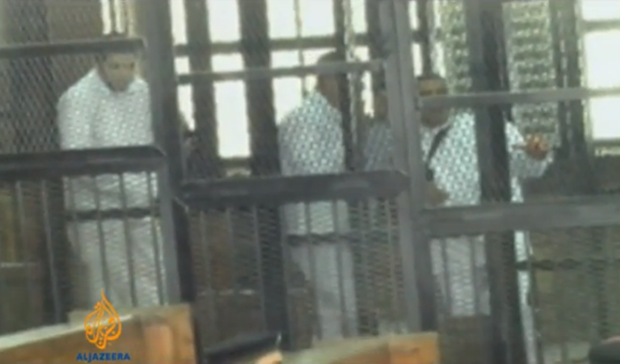
(Image: Al Jazeera English/YouTube)
In a heavy blow to press freedom in Egypt, three Al Jazeera English (AJE) journalists were convicted Monday on charges of spreading false news, aiding a terrorist organisation and endangering national security.
Australian award-winning journalist Peter Greste and Canadian-Egyptian national Mohamed Fahmy, AJE Cairo Bureau Chief, were handed down seven-year jail sentences each. A third AJE journalist, Baher Mohamed, was meanwhile, sentenced to ten years — three more than his colleagues, on an additional charge of possessing an empty bullet case. The three journalists have been in detention since December and have steadfastly denied the charges against them.
Ten defendants in the same case — including three foreign journalists — were sentenced to 10 years in absentia, while three others — including Anas El Beltagui, son of jailed Muslim Brotherhood leader Mohamed El Beltagui — were acquitted.
The rulings shocked and outraged journalists and rights activists around the world, fuelling concern about freedom of expression and the independence of the judiciary in Egypt, three years after the country witnessed a mass uprising that toppled the authoritarian regime of Hosni Mubarak, raising hopes of greater freedoms.The unexpectedly harsh verdicts also sent a chilling message to journalists working in Egypt that the government was adamant on pursuing its zero-tolerance approach to dissent and that journalists are not immune from the authorities’ policy of silencing critics at any cost.
Sherine Tadros, an Egyptian journalist and former AJE reporter denounced the verdict in a Twitter post shortly after it was pronounced, saying: “As a friend of the jailed journalists, I feel incredibly sad; as a journalist, I am scared and as an Egyptian, I’m ashamed.”
“The ruling sends a clear message to journalists to adhere to the official narrative or risk severe punishment,” an Egyptian broadcaster who spoke on condition of anonymity, told Index after the verdict.
Meanwhile, in an interview on Al Jazeera shortly after Monday’s court session, Amnesty International director Steve Crawshaw deplored what he called an “outrageous ruling”, adding that the verdict was another step in Egypt’s “campaign of terrorizing people and terrorizing the media”.
Since Islamist President Mohamed Morsi was deposed on 3 July, dozens of journalists have been detained in Egypt as part of a massive government crackdown on dissenters of all stripes: Muslim Brotherhood leaders and supporters, secular activists and journalists.The release this week of two journalists — including Abdulla El Shamy, a reporter for the Al Jazeera Arabic Channel who had been held in detention since mid August — had raised hopes that at least 14 other journalists still in detention, would also be acquitted. The judge’s decision to prolong the detention of the AJE journalists however, has raised questions about the new government’s commitment to democratic principles.
“Today’s verdict is deeply disappointing. The Egyptian people have over the past three years, expressed their wish for Egypt to be a democracy. Without freedom of the press there is no foundation for democracy,” Britain’s ambassador to Egypt, James Watt, told Reuters after the verdict.
In the past eleven months, journalists covering “anti-coup” protests staged by Muslim Brotherhood supporters have allegedly been deliberately targeted by security forces and pro-government mobs who accuse them of being “paid agents” and “spies”. Since the Islamist president’s ouster last July, five journalists have been shot dead and several others wounded by riot police while reporting on the clashes between protesters and security forces, prompting an outcry from rights groups. In a statement released in April, the Cairo-based Arab Network for Human Rights Information denounced the increased attacks on journalists and called on the Press Syndicate and media outlets to ensure their protection. The New York-based Committee for the Protection of Journalists which ranked Egypt among the three “most deadly” countries for journalists in a 2013 report, also called on the Egyptian government to investigate the assaults on journalists and hold the perpetrators of such crimes to account. The calls came in response to the death of Mayada Ashraf, a 22 year old reporter who worked for the privately-owned Al Dostour newspaper. She became Egypt’s latest journalist-fatality when she was shot in the head on 28 March while covering the dispersal of a Muslim Brotherhood protest in Cairo.
Several Egyptian journalists have in recent months, complained of intimidation. They said they had received threats from security agents or were subjected to smear campaigns aimed at tarnishing their reputation. In today’s repressive, deeply polarised climate in Egypt, many local journalists have decided to “play it safe” adopting the state narrative and persistently vilifying the Muslim Brotherhood while lionising the military and the new president.
Not surprisingly, there has been little sympathy for the jailed AJE journalists in the Egyptian press. Out of fear of being labelled “unpatriotic” by the public or suffering an even worse fate, most local journalists have either remained silent on the AJE case or taken a stand against the defendants, referring to them as part of a “Marriott Cell” and implying they were “traitors” who had been working to sabotage the country. Some of the guests interviewed by talk show hosts on state-influenced media channels recently, have echoed the prosecution’s argument that “channels like Al Jazeera brought down Iraq and were planning to do the same in Egypt”. In the wake of Monday’s court rulings, it is highly likely that the current trend of journalists practicing self-censorship will continue.
After Monday’s verdict, Egyptian State Television reported that Foreign Minister Sameh Shoukry had forcefully rejected pressure from foreign governments to overturn the court decision. On a visit to Cairo the day before, US Secretary of State John Kerry had reportedly raised the issue of media freedom in talks with the country’s new President Abdel Fattah El Sisi. Kerry who had expressed concern about the jailing of journalists in Egypt, reacted to the verdict Monday by calling it “chilling and draconian”.
Meanwhile, rights activists also expressed alarm at the outcome of Monday’s court proceedings, calling the trial “political”.
“The charges against the journalists are politicised,” said Mohamed Lotfy, a rights activist who has worked as a researcher with Amnesty International. “The AJE journalists are pawns, caught in the middle of a political dispute between Qatar and Egypt.”
The Egyptian authorities are angry over Qatar’s continued support for the Muslim Brotherhood, delcared by Egypt a “terrorist organisation” last December. The Egyptian government has also accused the Qatari-funded Al Jazeera network of bias in favour of the outlawed group — an accusation that has been repeatedly denied by the network.
While most activists are “appalled” by Monday’s verdicts and have laid the blame on what they call a “highly politicised judiciary”, Sahar Aziz, an Associate Professor of Law, Texas A&M University, told Index she believes judges in Egypt are themselves “victims” of the country’s turbulent political transition.
“There is evidence that some judges are under indirect pressure from the executive branch to adjudicate these political cases in ways that legitimise the official narrative that the state is facing a threat to its national security,” she said, adding that “Over the past year, a group of judges reputed to be independent have been expelled from the judiciary through ‘voluntary retirement’ or in other settlements with the governing judiciary apparatus. This has sent a chilling message to other judges that the cost of truly independent adjudication is prohibitively high.”
But the government’s piling pressure on the judges meant little to family members of the jailed journalists who were stunned by the ruling.
“It is shocking. We were totally unprepared for this,” said Andrew Greste, Peter’s brother who had expected Peter to fly back to Australia with him where his elderly parents were eagerly awaiting their son’s return. “Obviously, it will take some time to rethink our plans and decide what we can do next,” he told journalists outside the courtroom.
Mohamed Fahmy’s fiancee Marwa, who attended the court session, broke down crying on hearing the verdict. The couple had been planning their wedding in April.
Wafaa Bassiouny, Fahmy’s mother, shouted out as she walked out of the courtroom, “What has my son done to deserve this? He was just doing his job. He is now unable to move his right arm, isn’t that enough?”
Fahmy has been denied adequate medical treatment by prison authorities for a shoulder injury sustained before his arrest and has now lost full use of his right arm
But all hope is not lost. It is still highly likely that through an appeals process, the sentence may be reduced, or the journalists may even be acquitted at a later date. Only by recognising justice and reversing its current course, can the new government in Egypt gain credibility in the eyes of the international community and win the backing and solidarity it badly needs.
This article was posted on 24 June, 2014 at indexoncensorship.org
12 Jun 2014 | Cameroon, Iran, News, Nigeria, Russia
The 2014 World Cup in Brazil starts today, 32 nations preparing to battle it out across eight groups in the first stage of the tournament.
This year’s competition, like so many before it, comes with its designated group of death. For those not familiar with the lingo, it means the group containing the highest amount of strong teams. Or even more simply put, the group most difficult to progress from. (You can’t accuse the beautiful game of holding back on the melodrama).
Index has looked at the countries taking part in arguably the biggest show on earth, and put together our own group of death — the freedom of expression edition.
Cameroon
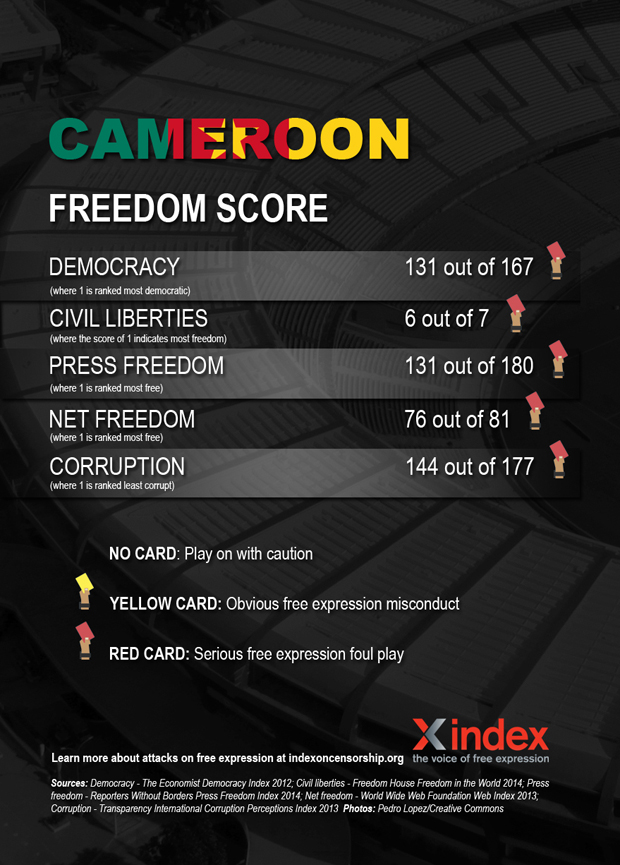
Cameroon — or the Indomitable Lions — have a solid track record in qualifying for the World Cup, having taken part seven time, more than any other African side. There were also the first African team to make it to the quarter final and are responsible for one of the most iconic moments in the tournament’s history. Their track record on free speech, however, is less impressive.
Freedom of expression is guaranteed in Cameroon’s constitution. Despite this, the government of Paul Biya — the country’s leader since 1982 — has been been accused numerous violations of free expression.
Large parts of the press are biased towards the ruling elite, while critical journalists face detainment, harassment and demands to reveal sources, among other things. Self censorship is widespread. In September 2013, 11 press outlets, including newspapers, radio stations and a TV station, were shut down for disrespecting “ethics and professional norms”. In 2010, former newspaper editor Germain Ngota, who had been investigating corruption allegations involving the state-run oil company, died in jail.
Freedom of assembly is often cracked down on. In 2012, former opposition presidential candidate Vincent-Sosthène Fouda and others were charged with “holding an unlawful demonstration”. The same year, security forces used tear against a crowd gathered to protest against Biya. In 2008, around 100 people were killed in clashes with police in anti-government riots.
Arts are not spared either. In 2013, Jean-Pierre Bekolo’s film Le President was banned in Cameroon because it discussed the end of Biya’s reign . In 2008, Lapiro de Mbanga, who criticised the constitutional change in term times that would allow Biya to stay in powers through song, was arrested.
Homosexuality is outlawed, and punishable by up to 14 years in prison. Human rights violations against LGBTI people, or those perceived to be, are “commonplace”. In July 2013, Eric Ohena Lembembe, director of the Cameroonian Foundation for AIDS (CAMFAIDS) was brutally murdered, in what friends suspect was an attack based on his pro-LGBTI advocacy.
Iran
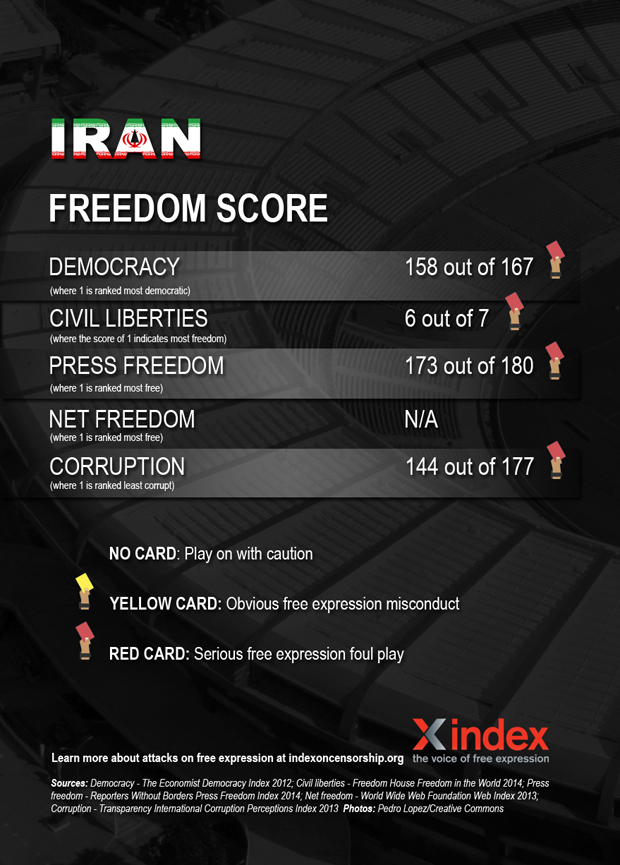
Team Melli will hope that their fourth appearance at the World Cup will see them progress from the group stages for the first time. When he was elected almost a year ago, there was hope that President Hassan Rouhani would be a progressive force within Iran. The results so far have been mixed.
Since coming into power, Rouhani has taken some steps to improve press freedom, such as withdrawing 50 motions against journalists, and lifting some restrictions on previously banned topics. However, the government still controls all TV and radio, and censorship and self-censorship is widespread. The latest figures put the number of jailed journalists in Iran at 35. In January 2013, a group of journalists were arrested for allegedly cooperating with “anti revolutionary” news outlets abroad. Journalists’ associations and civil society organisations that support freedom of expression have also been targeted.
The internet and social media played a significant part in publicising and documenting the protests that followed the 2009 election, which many Iranians believed was fraudulent. The regime has banned Facebook, YouTube, Twitter and, recently, Instagram. The lead-up to the 2013 elections saw Iranian leaders tightening access to the web, and silencing “negative” news. While Rouhani — seemingly an avid Twitter user — has indicated plans to relax web censorship, the country’s plans to launch a “national internet” are said to be going ahead.
In May, eight people were jailed on charges including blasphemy, propaganda against the ruling system, spreading lies insulting the country’s supreme leader Ayatollah Ali Khamenei on Facebook. Recently, a group of young people were arrested over a video posted of them singing and dancing along to the song “Happy”, which police called was a “vulgar clip” that had “hurt public chastity”. Some commentators believe the move was meant to intimidate Iranians and discourage online criticism.
Nigeria
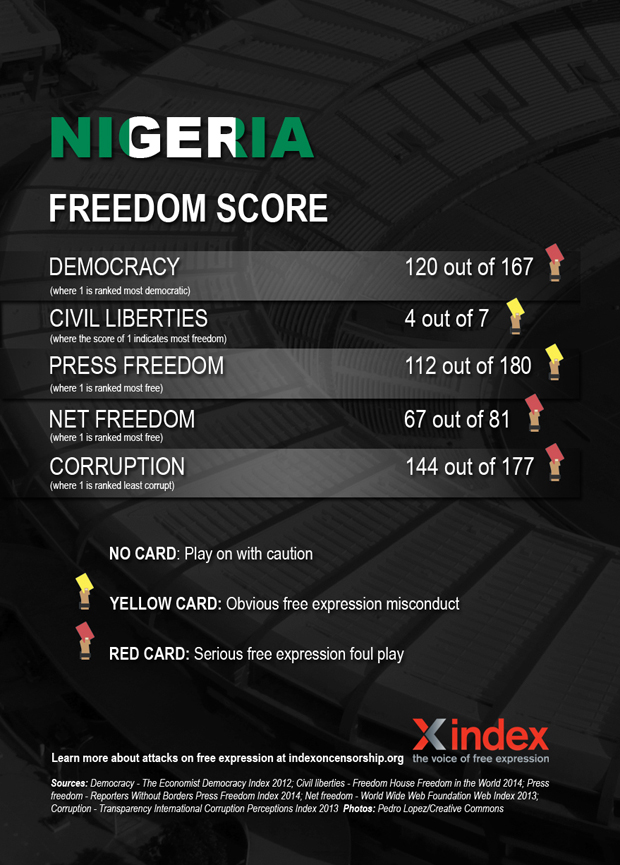
Brazil 2014 marks 20 years since Nigeria’s first outing at the World Cup, and the Super Eagles arrive at the tournament as reigning Africa Cup of Nations champions. The country’s leadership, however, is not a champion of free expression.
While parts of Nigerian media is controlled by people directly involved in politics, the country can also boast a lively independent media sector. However, journalists, especially those covering sensitive topics such as corruption or separatist and communal violence still face threats. Journalists have been arrested by security forces, and media outlets have been attacked by terrorists. Legal provisions such as sedition and criminal defamation also challenge press freedom. In 2011, a journalist was arrested over stories detailing alleged corruption in the Nigerian Football Federation.
The country’s freedom of information act was put in place in 2011. However, when human rights lawyer Rommy Mom tried to use the legislation to trace some 500 million of missing aid money allocated to his flood ravaged home state of Benue, he was met with threats from people connected to the state governor, and was forced to flee.
The Same Sex Marriage Prohibition Act 2013 outlawing gay marriage and relationships, was signed into law by President Goodluck Jonathan in January. The unpublished law makes it illegal for gay people to hold meetings, and outlaws the registration of homosexual clubs, organisations and associations. Those found to be participating in such acts face up to 14 years in jail.
Nigeria has come under international attention in recent months for abduction of the Chibok school girls by terrorist group Boko Haram. Among other things, Nigerians responded with the powerful #BringBackOurGirls campaign. In June however, authorities seemed to ban an offline protest against the kidnappings, before quickly backtracking. It is also worth noting that the Nigerian government has targeted journalists in their “war on terror”.
Russia
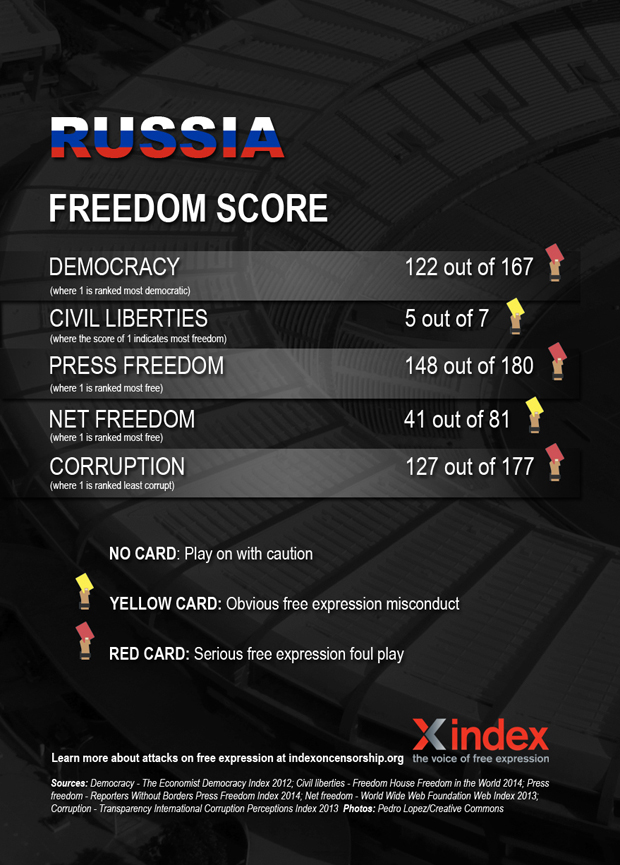
Team Sbornaya travel to Brazil in the knowledge that next time in the World Cup rolls around, they will be playing on home soil. Russia of course, recently hosted another international sporting event — the 2014 Winter Olympics. However, global attention did not improve the country’s poor record on freedom of expression. In fact, experts predicted a rise in censorship ahead of the Olympics.
Press freedom has long been under attack by Russian authorities, with TV news currently providing little beyond the official government line. In the last few months, the relatively well-respected TV channel RIA Novosti was liquidated following a decree by President Vladimir Putin, and replaced by a new press agency headed by a Kremlin-loyalist. In January, Dozhd, a popular independent TV channel was dropped by satellite and cable operators over a controversial survey. For the remaining critical journalists, Russia — one of the countries with the highest number of unpunished journalist murders — is a dangerous place to work.
The crackdown on the internet is widely believed to have started with the protests surrounding the elections securing Putin’s third term in power, organised partly through social media, but it has recently intensified. The Duma has adopted controversial amendments to an information law, targeting bloggers with blocking and fines for anything from failing to verify information posted, to using curse words. Also recently, the founder of “Russian Facebook” VKontakte says he was forced out, with the son of the head of Russia’s largest state-run media corporation predicted to take over as CEO. In 2013, the Duma approved legislation allowing immediate blocking of websites featuring content deemed “extremist”.
Public protests are discouraged through forceful responses by police, arrests, harsh fines and prison sentences. The country’s recent anti-gay legislation also pose a big threat to free expression and assembly. The ban on “promotion” of gay relationships, means that any form of expression deemed to be “gay propaganda” can be shut down. The law has also lead to physical attacks on Russia’s LGBT population.
An earlier version of this article stated that Brazil 2014 marks ten years since Nigeria’s first outing at the World Cup. This has been corrected.
This article was published on June 12, 2014 at indexoncensorship.org
23 May 2014 | Europe and Central Asia, News, Ukraine
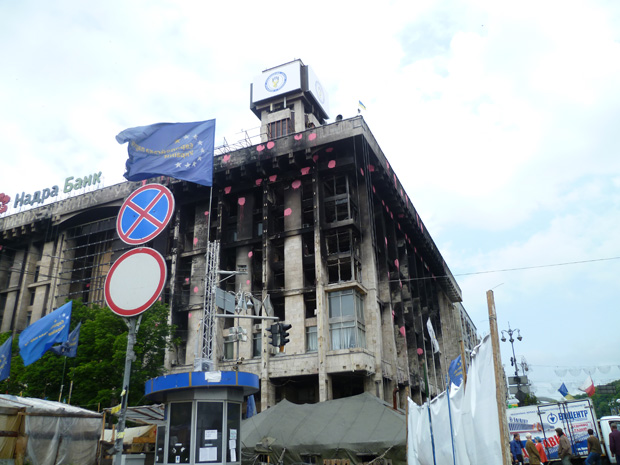
(Image: Index on Censorship)
Ukraine is seeing a “concerning pattern of grave violations of media freedom commitments” warns OSCE press freedom boss Dunja Mijatovic in a new report.
“As we know too well, in times of crisis and conflict, journalists and members of the media are among the first to be attacked, both physically and psychologically. Because those in power during periods of conflict demand complete control of all information free media is often their first target,” the report, published on Friday, states. Covering the time between 28 November 2013 and 23 May 2014, these are the three key findings.
1) Journalists face serious threats to their safety
There have been “nearly 300 reported cases of violence against journalists, including murder, physical assaults, kidnappings, threats, intimidations, detentions, imprisonments, and damage and confiscation of equipment”. These attacks are divided into two phases — the first covering the Maidan protests in Kiev, and the second the ongoing crisis in the east of the country. In Maidan, journalist Viacheslav Veremyi was killed, while almost 200 others were victims of violence. These include the over 40 journalists who were assaulted while covering protests on 13 December 2013. “In some cases,” the report states, “journalists were specifically targeted by law enforcement despite displaying clear identification as members of the press.” Since March, attacks on journalists in the east have intensified and gone without prosecution — something that “points to the breakdown of the rule of law in the parts of Ukraine affected by conflict”. On 18 May, Ukrainian military arrested two Russian journalists from LifeNews, while two journalists from Otkritiy Krymskiy Kanal were detained, interrogated, beaten and had their equipment seized by a group of people wearing military uniforms. Journalists in Crimea — recently annexed by Russia — who are not considered loyal to the region’s authorities, and who refuse to change citizenship, have been faced with regular threats, harassment and the possibility of eviction.
2) Ukraine is in the middle of an information war
There have been a number of accusations of the media being used to disseminate propaganda. “Propaganda and the deterioration of media freedom combine to fuel and contribute to the escalation of conflict, and once it starts they contribute to its escalation,” the report states. Among other thing, broadcasting stations “and related infrastructure” in Crimea, Sloviansk, Donetsk and Luhansk, have been attacked by unidentified and often armed individuals who supplanted regularly scheduled television programming with Russian state media. In March, the National Television and Radio Broadcasting Council of Ukraine ordered all cable operators to stop broadcasts of several Russian state TV channels. “No matter how loud and outrageous certain voices are, they will not prevail in a competitive and vibrant marketplace of ideas,” the report argues. “Therefore, any potentially problematic speech should be countered with arguments and more speech, rather than engaging in censorship.”
3) Media workers are being denied entry
In the past months, the OSCE has intervened in some 30 cases of journalists being denied entry into Ukraine and Crimea. “I have serious concerns about excessive restrictions on such travel, which ultimately affects the free flow of information and free media,” writes Mijatovic. Recently, Russia Today’s Arabic news crew, who travelled to Kiev to cover Sunday’s presidential election, were denied entry at immigration. Two crews from the All-Russia State Television and Radio Broadcasting Company (VGTRK) were not allowed to enter Ukraine, despite having all required accreditations. On a related note, a Rossiya-1 TV crew were this week deported from Ukraine.
This article was posted on May 23, 2014 at indexoncensorship.org







